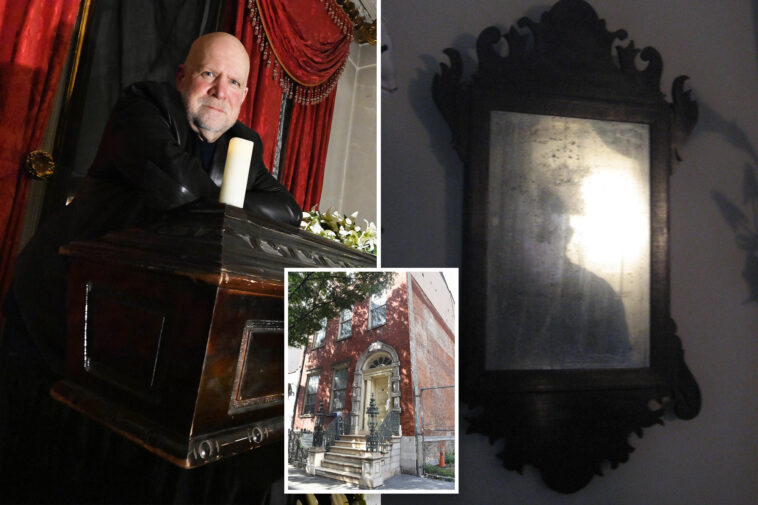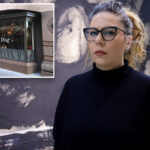He ain’t afraid of these Gotham ghosts.
The Merchant’s House Museum is so haunted that its staff actually hired its own ghost hunter — who spilled its bone-chilling secrets to The Post ahead of Halloween.
“Manhattan’s Most Haunted House,” at 29 East Fourth St. between Bowery and Lafayette, belonged over a century ago to Seabury Tredwell, a wealthy merchant who lived there with his wife and eight children — and paranormal investigator Dan Sturges says the family never left.
Sturges, who has conducted over 100 investigations at the house, which was built in 1832 and purchased by Tredwell in 1895, says he recorded sounds of footsteps, piano playing and even deceased residents speaking.
“We’re catching these strange, anomalous voices that aren’t heard at the time of the recording,” he told The Post.
“I got direct answers to questions saying, ‘Mr. Tredwell, did you know how to play the piano?’ And we recorded, ‘Yes. I strike the keys in succession.’
“And a girl in Mrs. Tredwell’s room asked permission to use a mirror and she asked, ‘Mrs. Tredwell, do you think I look pretty?’ And we recorded a female voice saying, ‘Pleasant enough.’”
Museum employees there after hours have also reported inexplicable activity.
“A staff member was working late in the offices on the third floor. Around 10 p.m. she distinctly heard footsteps of several children running about on the floor above and jumping onto the descending staircase. She heard no voices, just the patter of children’s footfalls, at which she decided to call it night,” said the museum’s director of operations, Emily Hill-Wright.
The Tredwells’ eighth child, Gertrude — the last remaining family member who lived alone in the NoHo abode for 24 years — kept the house in its original condition, “as Papa would have wanted.”
Start your day with all you need to know
Morning Report delivers the latest news, videos, photos and more.
Thanks for signing up!
In 1933, Gertrude died in the house, and “according to legend, it was [in] the same bed she was born in,” Sturges said.
After she passed, her cousin purchased the residence, listed on the National Register of Historic Places, and in 1936 turned it into a museum.
During its renovation, workers reported seeing a ghost, and in 2002, she was seen there again.
“The same woman in the same brown dress, drinking a cup of tea and staring out the kitchen window, was reported by different people decades apart,” Sturges said.
The nearly 10,000-square-foot 19th-century brick and marble row house, one of the last examples of late-Federal and Greek Revival architecture, has five floors guests can visit, plus an attic and a cellar that are off limits.
There are seven bedrooms, but only two, plus the servants’ quarters, are open to guests.
It is the only home in the city that is preserved both inside and out, with the furniture, dishes and clothes there all the same ones that the Tredwells used.
Hill-Wright recalled an instance where a curator found some of the family’s belongings — 3,000 of which are on display — mysteriously moved.
“He set up a display of Tredwell family teacups, saucers, and a teapot … Just as he completed his task, he was called to the telephone in the gift shop, down the hall … Upon his return, a minute or two later, he found all of the china completely rearranged. Yet he had heard nothing, and knew no one else had been in the room during his absence,” said Hill-Wright.
For his investigations, Sturges uses multiple recorders, electromagnetic field detectors and directional microphones specific to the rooms there — and all of his findings are sent to digital forensic examiners, photography experts and audio analysts for confirmation.
He even arranged a séance at the Merchant’s House in 2007 and hired psychic medium Richard Schoeller, who was picked up at Penn Station and not told what address he was going to.
Schoeller, “blew everybody’s minds,” when he provided information on the Irish servants who lived there, which were later verified with census records at the New York Historical Society.
“He was coming up with first names, last names of the servants, dates that they worked there. And the correct towns where these girls came from,” Sturges marveled.
Schoeller also mentioned an S-shaped, red settee, a piece of furniture that went missing from the house.
“When he brought that up, the museum director said, ‘There’s nobody in the world that knows that information except for me and the person I was speaking to in my office.’”








